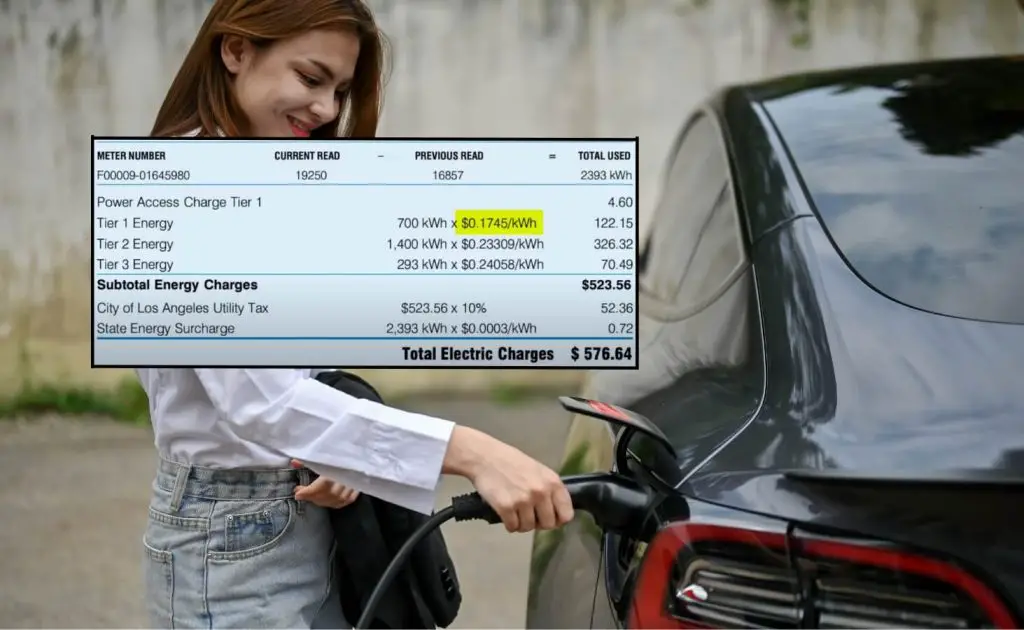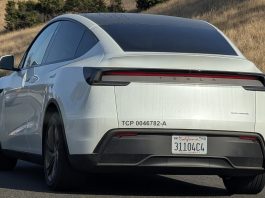Electric vehicles, such as Tesla cars, are becoming increasingly popular as environmentally friendly options if just not out of love for Elon Musk! Just saying! Tesla cars are a bit too famous to not make the joke.
Anyways, one common question among prospective EV owners is how much it costs to charge an electric car.
In this blog post, we will explore the factors that affect the cost of charging a Tesla electric car in the USA, including electricity rates, charging options, and approximate costs.

Table of Contents
Charging Your Tesla
Before we dive into the specifics, let’s start with the basics. The cost of charging a Tesla depends on several factors that influence the overall expense. Firstly, the battery capacity of the Tesla plays a significant role.
Different Tesla models have varying battery sizes, which affect the amount of energy needed to fully charge the vehicle. Secondly, the miles of range you want to add also impact the cost. Charging from empty to full will require more energy and, subsequently, incur higher costs compared to adding a smaller range.
However, the cost of electricity in your area is the most crucial factor that would affect you. Electricity rates differ across regions and utility companies, affecting the price you pay per kilowatt-hour (kWh). Understanding these factors will help you gauge the approximate cost of charging your Tesla and make informed decisions about your charging habits.
Factors Affecting Charging Your Tesla
Tesla currently offers four-passenger cars in the luxury EV segment: the flagship Model S large sedan, the Model 3 small sedan, and the Model X and Model Y crossovers. While there may be a little variation in terms of how much it’ll cost to fully charge each of these models, the cost per mile is generally consistent.
This means that, on average, it will cost you a similar amount to drive a mile in any of these Tesla models. However, it’s important to note that the cost of charging electric vehicles (EVs) is not solely determined by the brand or model. Other variables come into play, such as the battery capacity, the miles of range you want to add, and the cost of electricity in your area.
These factors influence the overall expense and should be taken into consideration when calculating the cost to charge an EV, regardless of the brand.
Electricity Rates
The cost of charging an electric car varies based on the electricity rates set by utility companies. Electricity rates are typically measured in kilowatt-hours (kWh). The rate you pay per kWh depends on your location and the specific utility company you are subscribed to. Rates can also vary based on peak and off-peak hours, time of year, and any available incentives or rebates.
Charging a Tesla electric car in the USA is generally more cost effective than traditional gasoline-powered vehicles, and the exact cost will depend on various factors such as electricity rates, charging options, and individual driving habits. Charging at home using a standard outlet or a Level 2 charger is convenient and can be affordable.
Electric utility service costs in the United States can vary significantly based on where you live. Different states and regions have varying electricity rates. To illustrate this, let’s consider North Dakota and California as examples.
In North Dakota, consumers typically pay slightly over $0.9 per kilowatt-hour (kWh) for electricity, while in California, the average cost is over $0.25 per kWh.
These figures highlight the substantial disparity in electricity prices across different regions. On a national level, the average cost of electricity per kWh in the United States is approximately $0.16.
Home Charging
Home charging options include using a standard 120-volt household outlet or installing a higher-powered Level 2 charger. The charging rate and cost will depend on the charging equipment used.
Standard 120-Volt Outlet
Charging your Tesla using a standard 120-volt outlet is the slowest charging option but is often sufficient for daily driving needs. The charging cost is similar to the cost of other household electrical devices. However, it may take longer to achieve a full charge.
Level 2 Charger
Installing a Level 2 charger provides faster charging times compared to a standard household outlet. These chargers require professional installation and use a 240-volt power supply. While the cost of purchasing and installing a Level 2 charger is an upfront investment, it can significantly reduce charging times.
Supercharging
Tesla’s Supercharger network provides fast-charging capabilities for long-distance travel and convenience. Supercharging stations are strategically located along highways and major travel routes, allowing Tesla owners to quickly recharge their vehicles. Supercharger rates are typically slightly higher than home charging rates but are still generally more cost-effective than traditional gasoline refueling.
Regional Variations
The cost of charging a Tesla can vary across different states and utility companies. Some regions offer lower electricity rates or time-of-use plans that offer reduced rates during off-peak hours. It is important to research and understand your specific electricity rates to accurately estimate the charging costs.
Does Charging a Tesla at Home Increase Your Electric Bill?
Cost Of Charging Your Tesla
To calculate the approximate cost of charging your Tesla, you need to know your electricity rate and the energy consumption of your vehicle. Tesla cars display energy consumption in kWh per mile driven. You can multiply the energy consumption by your electricity rate to estimate the cost per mile or total monthly charging costs.
A famous Youtuber Shelby Church, shares the ordeal of how she keeps track of her Tesla Model 3 charging on her YouTube channel. She uses EV Energy App to track her energy consumption and charging needs. She just has to sync the app with her Tesla to get real-time tracking of how much energy is being used by the EV whenever it is plugged in to charge.
Having a 50kWh battery capacity, she says the charging costs her $36.14 if her charging hours are 162kWh according to the charging app. The app has the option to link in the utility company to calculate the actual cost of charging costs. So, her electricity uses comes down to roughly $36 for every 700 miles.
Also, App users have the option to calculate the cost manually by jotting down the electricity rate for every kilowatt hour. Pretty neat and easy for everyone to keep track of the electricity charging costs of their EVs.
Shelby does talk about how charging at home or station differs from the total cost of charging among other factors including peak hours and off-peak hours. Also, she mentions how people owning a Tesla don’t really mind paying a bit extra for charging. Even Tesla says $4,300 gas savings on 6 years of ownership on its website.
Another YouTuber, Travel Tesla Dad, shares how he keeps track of his two Tesla cars charging using the Charge Stats feature in the Tesla app. According to his stats, he spends $85 to charge 428kWh on his Model 3, charging completely at home. However, he shares the stats of charging the Model Y at home and charging stations for $45 for 463kWh.
|
Model |
Cost Of Full Charge |
Cost/Mile |
Annual Cost Of Charging |
|
Tesla Model 3 |
$7-$32 |
$0.03-$0.10 |
$405-$1,350 |
|
Tesla Model Y |
$8-$32 |
$0.03-$0.11 |
$405-$1,485 |
|
Tesla Model S |
$11-$39 |
$0.03-$0.11 |
$405-$1,480 |
|
Tesla Model X |
$11-$39 |
$0.03-$0.13 |
$405-$1,755 |
The cost of a full charge and the associated cost per mile can vary among different Tesla models. For the Tesla Model 3, the cost of a full charge ranges from $7 to $32, resulting in a cost per mile of $0.03 to $0.10. This translates to an annual charging cost ranging from $405 to $1,350, and so on.
Charging At Home
For most EV owners, charging your electric vehicle at home is a super convenient and budget-friendly option! All you have to do is plug your car into a Level 1 three-prong 120-volt household outlet, a 240-volt outlet (like the one your clothes dryer uses), or a Level 2 electric car charging station that’s been installed.
The best part? The daily price of electricity doesn’t vary much between these charging levels, so you won’t be breaking the bank. However, if you want the fastest and most convenient option, a Level 2 charger is needed.
It’s like having a supercharger for your EV! So, whether you go with Level 1 or Level 2, you’ll be cruising along with affordable and hassle-free charging.
Cost Of Charging At Home
According to Tesla’s charging calculator on their website, the Wall Connector proves to be a cost-effective option. Taking into account a daily driving distance of 50 miles, the charging cost for a Model S would amount to $66.05 per month.
Similarly, a Model 3 would cost $58.74 per month, while a Model X would require a monthly expenditure of $77.61 for charging. For those driving a Model Y, the charging cost would be $66.05.
These estimates are based on the national average for residential energy, which stands at $0.15 per kilowatt-hour at the time of writing this post.
If you drive around 30 to 40 miles per day, Tesla suggests that you can use a regular 120-volt wall outlet for charging your vehicle. It’s a convenient option if you can leave your car plugged in overnight. This method costs about half as much as a Tesla Wall Connector and doesn’t require any installation.
Plus, you can take it with you and use it wherever there’s a 120-volt outlet available. Just keep in mind that this option charges your car at a slower rate, giving you around three miles of range per hour of charging. It’s a good choice for people who don’t drive long distances daily and want a simple and affordable charging solution.
Charging At A Station
For electric vehicle (EV) owners who don’t have the convenience of home charging, relying on public charging stations becomes essential. Level 2 public charging stations and Level 3 DC fast chargers are the go-to options when you’re on the road and need to recharge your EV.
Public charging is especially important for individuals living in multiunit housing complexes where installing personal charging stations is not feasible. Most electric vehicles, including Teslas with the appropriate adapter, can be charged using Level 2 public chargers.
The cost of charging your Tesla at a charging station can vary widely, ranging from free to $43. Several factors influence this cost, with the most significant ones being the size of your Tesla battery pack and your location.
The time it takes to charge different-sized batteries can vary, and the price of electricity can differ depending on where you are. These factors combine to determine how much you’ll pay when charging your Tesla at a charging station. It’s important to keep these variables in mind to understand the potential costs involved.
When it comes to charging a Tesla vehicle at a charging station, the cost can vary depending on the battery size. For most Tesla models with a 50 kWh battery, the charging cost ranges from absolutely free to around $21.50. However, if you have a larger battery, such as a 100 kWh battery, the cost can go up to approximately $43 to fully charge your vehicle at a charging station.
Tesla Superchargers have become a prominent feature in the world of electric vehicle charging. While Tesla doesn’t disclose its pricing, numerous reviews suggest that it typically costs around $25 to fully charge at a Tesla Supercharger station. These stations are strategically placed worldwide and boast over 40,000 Level 3 Superchargers.
The Superchargers offer incredibly fast charging speeds, allowing Tesla drivers to gain approximately 162 to 200 miles of range in just about 15 minutes. However, the specific fee for using a Supercharger varies depending on the location.
Tesla charges customers by the minute, with the rate per minute determined by the charging speed tier available at each Supercharger station.
What To Expect In The Future?
The impact of charging your Tesla on your electric bill depends on two key factors: the electricity cost per kilowatt-hour (kWh) in your area and your driving habits. Essentially, the higher the electricity rate from your energy provider, the more it will cost to charge your Tesla at home. Additionally, the more you drive, the more frequent charging you’ll need.
On average, Americans drive around 1,200 miles per month. Tesla vehicles typically have battery capacities ranging from 50 to 100 kWh, with an average range of approximately 267 miles.
Considering the average electricity cost per kWh in the United States at $0.16, if you were to charge your Tesla at home exclusively, the estimated increase in your monthly electric bill would range from approximately $35.92 to $71.84.
Electric motors have a remarkable advantage over gas engines in terms of efficiency, making electric vehicles (EVs) charged at home a more cost-effective choice compared to comparable gas-powered vehicles. In an EV, an impressive 87 to 91 percent of the consumed energy is efficiently utilized to propel the vehicle forward.
On the other hand, a gas vehicle typically converts only 16 to 25 percent of the energy into actual movement. While gas-electric hybrid powertrains can narrow the cost gap to some extent, even highly efficient hybrids like the 57-mpg Toyota Prius often fall short in terms of operating costs when compared to the most economical Tesla Model 3.
The inherent efficiency of electric motors contributes to the affordability of running an EV, making it a compelling option for cost-conscious drivers.
Bottomline
In conclusion, the cost of charging your Tesla and its impact on your electric bill depend on various factors. The electricity cost per kilowatt-hour in your location and your driving habits play a significant role. Higher electricity rates will result in increased charging costs, while more extensive driving will require more frequent charging.
The cost of charging your electric vehicle at a charging station is heavily influenced by the type of charging station you choose. Electrify America stations, for example, typically charge prices ranging from $0.31 to $0.43 per kilowatt-hour. These stations follow a pay-per-use model.
On the other hand, there are charging stations like Volta stations that operate on an ad- and retailer-supported model, making them completely free to use. Some places even offer to charge for free, and some have super peak hours with additional charges on standard charging uses in their premises.
Tesla’s Supercharger network provides fast-charging options for long-distance travel. By understanding your local electricity rates and energy consumption, you can effortlessly calculate the approximate cost of charging your Tesla. How much do you pay to charge your Tesla, do share the cost of charging in your areas in the comment section.




90 cents per kwh in north Dakota? Seems excessive
The EV energy conversion efficiency do not factor the utility company energy conversion efficiency. The calculation to be fair must be from chemical fuel to useful mechanical
Energy. So if the EV is say 90%, multiply it with the utility company efficiency say if 60%. Then result is 36%. You can play with the numbers as mine is just a calculation sample.
IMHO.
I have solar on my roof so it would not cost me a dime to charge an EV if I owned one.